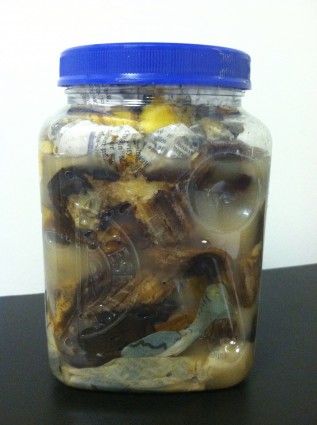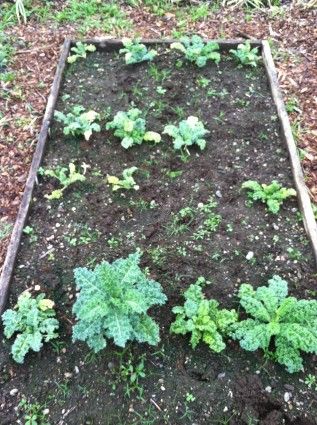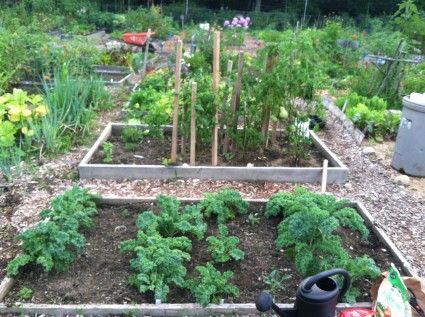Monthly Archives: October 2013
“Detachment is not that you should own nothing, but that nothing should own you.”
~Ali ibn abi Talib
Use Compost Tea to Supercharge Organic Garden Growth
Compost Tea as a Fertilizer
We experimented with our own version of compost tea this summer. It happened organically (haha 😉 ) when a tub of our compost (mostly banana & orange peels) started to form liquid nutrients at the bottom. Upon researching this topic, it turns out that compost tea is a well known method for growing and protecting an organic garden. In fact, compost tea making companies and centers have started to sprout up in the US on the west coast.
Side Note: Notice that we have several pieces of newspaper built into this compost tub. The reason is that the newspaper provides carbon and prevents our compost from growing mold. Eventually the newspaper decomposes and it too becomes part of the soil.
After a couple days of letting the organic liquid accumulate inside the tub, we poured the compost tea into the soil surrounding one of our kale plants. Our rationale was that providing liquid nutrients directly to a plant’s root system will help it grow. Thus we’d create a natural way of improving taste, quality, and yields.
As humans wash down supplements with water to increase absorption, we did the same with the compost tea and kale plant, giving the area ample water to let the compost tea seep into the roots. Three weeks later, we could see a noticeable difference in growth.
We added compost tea to the soil surrounding the second plant in from the left:
Little did we know that the effectiveness of compost tea is a widely debated topic in the organic gardening community. Some believe this to be an effective practice for growth and insect repelling while others believe its effectiveness is overstated.
Research is well underway in determining answers to these questions and our readers might ask where we stand on the issue. We’re firm believers in the belief that the quality of the soil is strongly correlated with the quality of the food grown. We can only speak to the above experiment and as you can see the kale plant we fertilized with compost tea absolutely flourished (as did the entire row compared to the row behind it.)
Two months later, the plant that we applied compost tea is still the biggest yielder:
We’re far from experts on this topic but felt that this experiment was worth sharing with our readers. Before embarking on the compost tea journey, be sure to research the safest and most prudent way to do so but also beware of outlets trying to sell aquatic pumps and all sorts of unnecessary gadgets.
Have any of you used compost tea in your garden? What have your experiences been like?
Jimmy Valvano’s 1993 ESPY Speech
“Don’t give up, don’t ever give up.”
Angkor Wat and “One Dolla Chia”
Drive Nacho Drive wrote an awesome piece about their experience at Angkor Wat.
To say the least, we shared some of the same emotions when arriving at the magical site.
The trail wound its way through the trees for a while, and soon we noticed some half-buried hand carved stone work protruding from the jungle floor. As we walked on through the dense foliage more and more stone carvings were noticeable under cover of vines and half buried in the mud. Suddenly the trail hooked to the left and we found ourselves on an unexcavated stone thoroughfare of some kind, lined on both sides by intricate carved statues of seven-headed snake creatures, ferns, and round columns.
We felt what it must have been like for the first discoverers of this site, to be walking in the jungle and to come upon fragments of an ancient civilization.
Read more — here.
Image via Drive Nacho Drive
Can money buy happiness? Wine edition
Felix Salmon, one of the most respected economists in the world wrote a very interesting, funny piece on how wine is one of the few things that can buy happiness (in his opinion).
But here’s the trick: if you can’t buy happiness by spending more money on higher quality, then you can buy happiness by spending money taking advantage of all the reasons why people still engage in blind tastings, despite the fact that they are a very bad way to judge a wine’s quality. If you know what the wine you’re tasting is, if you know where it comes from, if you know who made it, if you’ve met the winemaker, and in general, if you know how expensive it is — then that knowledge deeply affects — nearly always to the upside — the way in which you taste and appreciate the wine in question.Fortunately, nearly all of the time that we taste wine in the real world, we do know what we’re drinking — and we do know (at least roughly) how expensive it is. In those situations, the evidence is clear: When we know how much we spent on what we’re drinking, then the correlation between price and enjoyment is incredibly strong.
The more you spend on a wine, the more you like it.
Read more — here.
“Put your heart, mind, intellect, and soul even to your smallest acts. This is the secret of success.”
~Swami Sivananda
“The past always seems better when you look back on it than it did at the time. And the present never looks as good as it will in the future.” -Peter Benchley
How To Eat Mindfully, A Practice That Will Change Your Life
We have talked a lot in the past about mindful eating. Dr. Joel Kahn does a great job explaining this practice.
4. Sit and chew.
I do not know how many meals I eat standing, but sitting at a table, sharing conversation, paying attention to colors, textures and tastes are the way most meals where eaten in our parents’ youth. In addition, recognizing that digestion begins in the mouth and that chewing foods slowly and completely, something that has been referred to as Chewdiasm, enhances our nutrition and reduces our calories will help us maintain control.
Read on — here.




